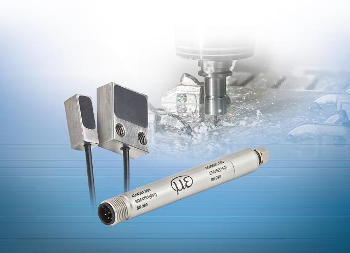Precision sensor manufacturer Micro-Epsilon UK has launched a next-generation displacement measurement system for high speed milling and grinding machine applications.
The system (i.e. sensor and controller) is compact enough to be installed inside the spindle, typically on the labyrinth ring, in order to measure the thermal and centrifugal force extension of the spindle (the previous design required larger, externally-mounted electronics). These measurements are output to a CNC system as correctional values, enabling the machine to compensate for any spindle positioning errors.

The new eddyNCDT SGS 4701 (Spindle Growth System) displacement measurement system from Micro-Epsilon operates on the eddy current measuring principle and is therefore non-contact and wear-free. The system is designed for harsh machining environments and is resistant to heat, dust, oils and coolants.
The SGS 4701 comprises a sensor, sensor cable and controller, which is factory-calibrated for either ferromagnetic or non-ferromagnetic measurement objects, depending on individual customer requirements.
Unwanted thermal expansion
With high speed milling and grinding machines, a lot of heat is generated, which can result in tool accuracy problems, particularly during the machining of very precise components, where high accuracy is required. Unwanted thermal expansion of the spindle can occur if the CNC system does not actively compensate for these temperature increases. If the spindle expands by even a small amount, the machine tool head can cut too deep. Therefore, the linear thermal extension of the machine tool spindle needs to be compensated for in order to keep the tool in a defined position at all times.
Chris Jones, Managing Director at Micro-Epsilon UK comments: “By working closely with machine builders and spindle manufacturers, Micro-Epsilon has developed an even more compact sensor system. The SGS 4701 sensor and controller are now both small enough to be installed inside the spindle, enabling measurements to be taken on the labyrinth ring of the spindle, for example. Alternatively, the sensor can be installed inside the spindle with the controller mounted externally on the spindle housing via a flange.”
“Up to now, most solutions to the problem of thermal expansion of spindles have been externally-mounted ones, with the sensor mounted outside the spindle itself. This is a compromise in measurement technique as the real thermal expansion error is inside the centre of the spindle. By using its expertise across the Group, Micro-Epsilon has developed even smaller electronics, enabling the size of the sensor and the controller to be reduced even further,” he adds.
As well as measuring linear thermal extension, the SGS 4701 has integral temperature measurement capability. These measurements are output to a CNC system as correctional values, enabling the machine tool to compensate for any temperature increases. This capability eliminates the need for the customer to provide additional temperature sensor technology.
The miniature SGS 4701 sensor is available in two sizes, with dimensions of either 4.5 x 10 x 12mm3 or 4 x 4 x 10mm3. System linearity is +/- 2µm and system resolution (static, midrange) is 0.5µm.
The SGS 4701 system is also fully interchangeable with its predecessor, the SGS 4311, allowing customers to upgrade easily at any time.
For more information on the eddyNCDT SGS 4701, please call the Micro-Epsilon sales department on 0151 355 6070 or email [email protected].
About Micro-Epsilon
Micro-Epsilon is a major global manufacturer of sensors, headquartered in Germany. The company’s range of displacement sensors measure everything from to distance, position, vibration, dimensions and thickness, using both contact and non-contact measurement techniques. These techniques include 1D, 2D and even 3D laser-optical sensors and systems, eddy-current, capacitive, LVDT & inductive, potentiometric and draw-wire principles. In addition, Micro Epsilon has developed its own range of non-contact infrared temperature sensors that can measure virtually any target temperature from -40 to +3,300°C. The company also manufactures a comprehensive range of colour recognition sensors.
With more than 45 years’ experience in the industry, Micro-Epsilon isn’t just a sensor manufacturer. The company is highly innovative and understands the importance of providing complete solutions and support services for its customers. The firm is renowned for its expertise in consulting, development and application of industrial sensors to complex, customer-specific solutions for measurement, inspection and automation. The focus is on selling technical advantage to its customers.